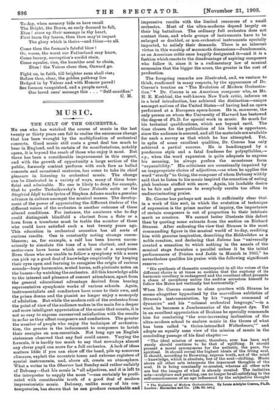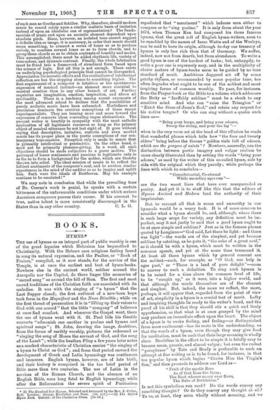MUSIC.
THE CULT OF THE ORCHESTRA.
No one who has watched the course of music in the last twenty or thirty years can fail to realise the enormous change that has been wrought by the multiplication of orchestral concerts. Good music still costs a great deal too much to hear in England, and in certain of its manifestations, notably opera, it is beyond the reach of those who enjoy it most. But there has been a considerable improvement in this respect, and with the growth of opportunity a large section of the public, formerly content perforce with such fare as ballad concerts and occasional oratorios, has come to take its chief pleasure in listening to orchestral musie. The change can be illustrated in a variety of ways, many of them bene- ficial and admirable. No one is likely to deny, for example, that to prefer Tschaikowsky's Casse Noisette suite or the Siegfried Idyll to the lyrics of Stephen Adams marks a genuine advance in culture amongst the musical masses. The develop- ment of the power of appreciating the different timbres of the different voices of the orchestra is another outcome of these altered conditions. For instance, the amateurs who to-day could distinguish blindfold a clarinet from a flute or a horn from a trombone must be treble the number of those who could have satisfied such a test twenty years ago. This education in orchestral acoustics has all sorts of curious results. One is constantly noting strange resem- blances; as, for example, a calf has been known uncon- sciously to simulate the tone of a bass clarinet, and some motor-cars have horns which remind one of a saxophone. Even those who are unable to follow a symphony with a score can pick up a good deal of knowledge empirically by keeping their eyes open and learning to recognise the origin of various sounds—harp harmonics, muted horns, soft pizzicato notes on the basses—by watching the orchestra. All this knowledge adds to the interest and pleasure of concert attendance, apart from the general educational advantage derived from hearing representative symphonic works of various schools. Again, instrumentalists and conductors have come to their own, and the prima donna and the pianist no longer enjoy a monopoly of adulation. But while the modern cult of the orchestra from the point of view of the audience makes in the main for a deeper and more intelligent appreciation of the music that counts, it is not so easy to express unreserved satisfaction with the results in so far as they affect composers and conductors. The greater the number of people who enjoy the technique of orchestra- tion, the greater is the inducement to composers to lavish their energies on non-essentials. Not long ago an English statesman observed that any fool could annex. Varying the formula, it is hardly too much to say that nowadays almost any clever pupil can score for a full orchestra. A lack of ideas matters little if you can show off the band, pile up sonorous climaxes, exploit the eccentric tones and extreme registers of special instruments, and, above all, create an atmosphere. What a writer in the Observer last Sunday said rather unfairly of Debussy—that his music is "all adjectives, and it is left to the interpreter to supply the noun "—can certainly be predi- cated with considerable truth of a good deal of modern impressionistic music. Debussy, unlike many of his con- temporaries, has shown that he can produce remarkable and
impressive results with the limited resources of a small orchestra. Most of the ultra-moderns depend largely on their big battalions. The ordinary full orchestra does not content them, and whole groups of instruments have to be enlarged or doubled, or non-orchestral instruments specially imported, to satisfy their demands. There is no inherent virtue in this worship of mammoth dimensions—Jumbomania, as an American critic once happily designated it—and it is a fashion which reacts to the disadvantage of aspiring composers who follow it, since it is a rudimentary law of musical economics that the bigger the score, the greater is the cost of production.
The foregoing remarks are illustrated, and, we venture to think, confirmed in many respects, by the appearance of Dr.
Coerne's treatise on "The Evolution of Modern Orchestra- tion."* Dr. Coerne is an American composer who, as Mr.
H. E. Krehbiel, the well-known New York critic, informs us in a brief introduction, has achieved the distinction—unique amongst natives of the United States—of having had an opera performed at a European opera-house. He is, moreover, the only person on whom bhe University of Harvard has bestowed the degree of Ph.D. for special work in music. So much for his technical qualifications, which are beyond cavil. The time chosen for the publication of his book is opportune, since the audience is assured, and all the materials are available for such a survey as that which he has attempted. Yet, in spite of some excellent qualities, Dr. Coerne has only achieved a partial success. He is handicapped by a ponderous style and a fatal fondness for polysyllables,-
e.g., when the word expansion is quite adequate to express
his meaning, be always prefers the monstrous form "expansibility." His criticisms are occasionally impaired by an inappropriate choice of adjectives,—as when he applies the word "sturdy" to Grieg, the composer of whom Debussy wittily said that to listen to his music inspired the sensation of eating pink bonbons stuffed with snow. Again, his laudable desire to be fair and generous to everybody results too often in undiscriminating praise.
Dr. Coerne has perhaps not made it sufficiently clear that in a work of this sort, in which the evolution of technique of expression is the prime matter of inquiry, the importance of certain composers is out of proportion to their intrinsic merit as creators. We cannot better illustrate this defect than by quoting some extracts from the section on Richard Strauss. After endorsing the view that Strauss is the most
commanding figure in the musical world of to-day, crediting him with genuine inspiration, describing the Heldenleben as a noble creation, and declaring that Salome has "universally created a sensation to which nothing in the annals of the musical stage furnishes a parallel unless it be the initial performances of Tristan und Isolde in Munich in 1865," he nevertheless qualifies his praise with the following significant
reserve :—
"His synthesis of thematic counterpoint in all the voices of the different choirs is at times so reckless that the euphony of its harmonic corollary is endangered and the resultant effect presents a chaos of cacophony unless the auditor accustom himself to follow the Melos not vertically but horizontally."
When Dr. Coerne comes to close quarters with Strauss be seems altogether hypnotised by the marvellous subtleties of
Strauss's instrumentation, by his "superb command of dynamics" and his "colossal orchestral language,"—in a word, he becomes a Jumbomaniac of the deepest dye. Yet in an excellent appreciation of Brahms he specially commends him for combating "the ever-increasing inclination of the
ultra-modern school to enslave music in the throes of what has been called 'a thrice-intensified Weltsehmerz," and
adopts an equally sane view of the mission of music in the concluding passage of his final chapter :—
"The ideal mission of music, therefore, ever has been and surely should continue to be that of uplifting. It should present a moral synonymous for the aesthetic, the pure, the spiritual. It should reveal the highest ideals of the living soul. It should, according to Browning, express truth, not of the mind —knowledge, which is absolute, but of the soul—shifting. Music above all other arts interprets the innermost thoughts of the soul. It is being constantly re-created, whereas all other arts are but the images of what is already created. The imitative arts—sculpture and painting, can no longer be all-satisfying to the self-consciousness of an age influenced by the subjective thought * The Evolution of Modern Orchestration. By LOUIS Adolphe Come, Ph.D. London ; Macmillan and Co. [12A 6d. net.] of such men as Goethe and Schiller. Why, therefore, should modern music, be reared solely upon a similar realistic basis of imitation instead of upon an idealistic one of representation ? The funda- mentals of music rest upon an acoustic element dependent upon absolute pitch. Since, however, an isolated tone cannot suggest a definite idea or image, it is necessary, in order that music should mean something, to connect a series of tones so as to produce melody, to combine several tones so as to form chords, and to group these chords so as to obtain contrasts of tonality and modes. This accomplished, there must be added rhythmic life, variety of tone-colour, and dynamic contrast. Finally, the whole fabrication must be fitted into a framework of structural form based upon the science of logic. But all this is not enough. There exists an underlying psychological principle that cannot be disregarded. Appreciation for acoustic effects and the realizations of intellectual reflection are but the stepping stones to something higher. The first requirement of a composer is intuition or the spontaneous expression of musical instinct—an element more essential to musical creation than to any other branch of art. Further requisites are imagination, emotion, inspiration, and above all spirituality. There is a tendency among recent exponents of the most advanced school to declare that the possibilities of purely testhetic music have been exhausted. Morbidness and pessimism dominate the creative conceptions of these recent experimentalists. They are leaning more and more toward the expression of concrete ideas concealing vague abstractions. Tho present writer is heartily in sympathy with the most catholic application of all legitimate resources so long as the primary object of musical utterance be not lost sight of. It goes without saying that descriptive, imitative, realistic and even morbid music has its proper place in the poetic conceptions of our con- temporary tone-masters. Exception only is made to music that is primarily intellectual or pessimistic. On the other hand, it need not be primarily pleasure-giving. In a word, all such objectives should be made subjective to a purer motive. The portrayal of lesser sentiments and passions is legitimate only in AO far as to form a background for the nobler, which are thereby thrown into relief. The ideal mission of music is to reflect the loftiest sentiments of the composer's soul, and to awaken similar experiences in the mind of the auditor so as to inspire and uplift him. Such were the ideals of Beethoven. May his example continue to be emulated !"
We may note in conclusion that while the prevailing tone of Dr. Coerne's work is genial, he speaks with a certain bitterness of the unfavourable conditions under which serious American composers pursue their career. If his account be true, native talent is more consistently discouraged in the States than in any other country. C. L. G.

































































 Previous page
Previous page